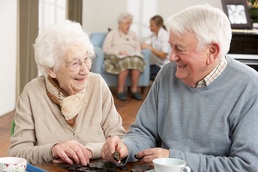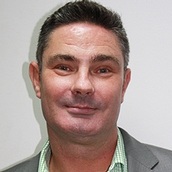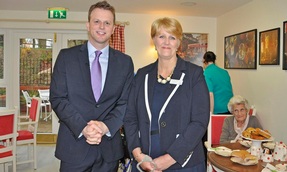Care homes suffering from image problem, as media focuses on negative dementia statistics
Accelerating dementia care challenges have brought the media portrayal of care home performance under the spotlight this week, after an Alzheimer’s Society publication highlighted the negative perception UK families have of the sector.

The Alzheimer’s Society’s ‘Low expectations’ report has led to a great deal of reflection amongst care sector professionals on how the public see care homes, at the same time as questioning the industry’s ability to support a quality life for an increasing number of adults diagnosed with dementia.
Data gathered by the report estimates that ‘in excess of 80 per cent of residents living in care homes have dementia or significant memory problems’, meaning the condition in its many forms – including Alzheimer’s, vascular dementia and Lewy body disease – is now without a doubt the primary concern of the sector.
In this respect, chief executive Jeremy Hughes does not believe that the level of anxiety associated with dementia care in a residential setting is without its impact. With findings that show less than a third of the public believe people with dementia are well treated when in care homes, and with 70 per cent of adults saying they would be ‘scared or fairly scared’ at the prospect of relocating to a home themselves, Mr Hughes claims that, as a result, too many people “are settling for average”.
Writing in the report, actor Kevin Whately – who is one of the charity’s ambassadors – further sums up the dilemma: “What this report finds is that, while across the country there are both good and bad examples of care being delivered, expectations – from people in care homes to the staff who care for them, from their relatives to the public at large – are worryingly low. Put simply, those who don’t have personal experience of care homes are scared of them and those who do don’t associate good care with a decent quality of life. This is dangerous, not least because echoed through society it can become a self-fulfilling prophecy.”

Despite this negativity the report refers to the worst cases of care home abuse, as a ‘rare spectre’, which is perhaps why some called for calm as much of the media coverage focused on the most negative figures, declaring a national ‘scandal’.
Ian Buchan, director of care services at older people’s charity Independent Age, was among those to call for calm, pointing out that “there is a great deal of high quality care that goes largely unnoticed” and warning that “focusing on poor quality care means that care homes as a whole get a bad name”.
Further examples of positive figures from the report include that 74 per cent of family members would recommend their loved one’s care home and that 68 per cent rate dementia care as good; so there is clearly some discrepancy between fact and perception occurring.
Professor Julienne Meyer, who is also executive director of the My Home Life project promoting quality of life in care homes, agrees with one of the report’s key recommendations that a stronger focus on dementia care training is crucial in making sure that standards improve.
She says: "What we now know is that there are more people going into care homes with dementia. The report highlights some important issues around the fact that more needs to be done with regards to dementia training, whilst acknowledging some of the financial pressures that are getting in the way."
Professor Meyer also feels strongly that care homes should aspire to less resident relocations, with the report estimating that 32 per cent of those with dementia have been moved again since first entering residential care, because the home in question wasn’t equipped to cope with increasing needs.
She continues: “Since the Care and Support White Paper, the process of finding information on care homes has started to be addressed. It's worrying that people who are living with dementia are being moved around from one home to another as they cannot be managed. The report makes an important point that we need to keep people who are living with dementia in one place. Furthermore, it highlights the need for leadership in the care home sector. If all care homes have 80 per cent of residents living with dementia, then all care homes should be centres for dementia excellence. It is a welcome statement that the report highlights how the social care system needs to work with care homes.”

Operations manager for provider Colten Care Ltd, June Gallagher, also discusses the commitment homes need to show to their residents, saying: “The report shows the need for care homes with trained staff who understand the condition. It is only by building greater awareness and understanding that we can engage people on the issue of quality of care. For us, dementia care is about cherishing people’s independence and enabling them to maintain that independence and their skills for as long as they can.
“In all our care homes, we have dedicated carers who promote person-centred care. Our dementia care education programme, developed with and accredited by Bournemouth University, is mandatory for all staff who work in our dementia homes. In addition, every feature of our dementia homes is designed with therapeutic care in mind including themed rooms, memory boxes, signage, pictures and the use of colour and shade. These elements optimise our environments to be as dementia friendly as possible.”

(ECCA) chief executive Martin Green points out that there are plenty of active dementia initiatives for care homes to embrace in challenging the negative image of their industry.
He says: “People can lead positive and fulfilling lives with dementia and it is for care homes, and all other services, and health and social care staff to demonstrate that. We condemn poor practice and have recently supported new initiatives around dementia such as the ‘Dementia Care and Support Compact’ and the ‘Dementia Pledge’ which our members are enthusiastically signing up to, and which commits providers to delivering good quality care, training and dementia awareness. We will continue to encourage these positive moves to better care, as well as support people and their families facing dementia.”
Mr Green also calls on the media to better present the positive work undertaken in care homes, saying: “The reality is that the majority of care homes meet the essential standards and as The Alzheimer’s Society’s report shows, 74 per cent of relatives would recommend their family member’s care home. The negativity towards care services will to some extent reflect people’s perceptions of dementia itself and what can be done. We will ensure the key lessons from this report are disseminated to our members and that all are encouraged to communicate what works well and assess what can be improved.”
executive director Des Kelly also comments: “This important report highlights the fact that 80 per cent of residents in care homes are people with dementia or significant memory loss – this confirms a view reflected by our members that care homes have become specialist community resources. It is essential therefore that this specialist status is matched by effective leadership and management, staff selection, training, supervision and support, and that sufficient resources are available to fund care provision appropriately.”
Regardless of the view taken on the care home sector’s current performance, however, a rapidly ageing populace guarantees that these challenges are only poised to multiply in future, as cognitive neuroscientist and age specialist Dr Lynda Shaw points out.
Studying the UK’s ‘baby boomers’ generation, Dr Shaw believes that care homes will experience a sea-change in the level of care and type of lifestyle expected by a maturing population who have a completely different mentality to those who came before them.

She comments: “This generation earned well in the 1980s and beyond. Most are financially stable and can afford care homes if they have to or wish to. They are well travelled, intelligent and highly active.”
From her own research and interviewing of baby boomers she concludes that care environments will need to be more ‘socially stimulating’, saying: “All interviewees reported either daily gym visits, sessions with personal trainers, regular 50 mile cycle rides and yoga classes. Two of them run marathons on a regular basis. Each respondent enjoys using Facebook, Skype and sending emails. They have smart phones, tablets and laptops. They shop and do their banking online. Without exception they expect to keep learning about new technologies, in fact they are looking forward to it.”
Dr Shaw believes that some of the care standards reported will not be good enough for these people, saying: “It is a disgrace that the findings of a survey conducted by Age Concern and Help the Aged showed that 52 per cent of older people think that those who plan services do not pay enough attention to the needs of older people they are trying to help.”
She continues: “The older generation are the most knowledgeable, experienced members of our society and we need to ensure that they get the invigorating, independent later life that they want and deserve. All too often older people feel cut off from the rest of society. Interactions between old and young people are essential as the generations can learn from one another; a culture that is the norm in Mediterranean countries but is sadly lacking in the UK.
“It is also vital to flag that future generations may struggle far more than the baby boomers so again there will be another wave of change required by care homes.”
To vote on whether you think the media focusses too much on poor care, go to www.carehome.co.uk/news/article.cfm/id/22/does-the-media-focus-too-much-on-poor-care
Latest News Analysis
 04-Sep-19
Extra £1.5 billion announced for social care in Chancellor's Spending Review
04-Sep-19
Extra £1.5 billion announced for social care in Chancellor's Spending Review
 02-Jul-19
Department of Health forced to rethink care homes' nursing rates after legal challenge
02-Jul-19
Department of Health forced to rethink care homes' nursing rates after legal challenge
 18-Jun-19
Overnight care workers forced to sleep in offices and told 'bring your own bedding'
18-Jun-19
Overnight care workers forced to sleep in offices and told 'bring your own bedding'
 14-Jun-19
Back in the closet: Third of care home staff have had no LGBT+ awareness training
14-Jun-19
Back in the closet: Third of care home staff have had no LGBT+ awareness training
 11-Jun-19
PM candidates on social care: Rory Stewart calls fixing care an 'unfinished revolution'
11-Jun-19
PM candidates on social care: Rory Stewart calls fixing care an 'unfinished revolution'